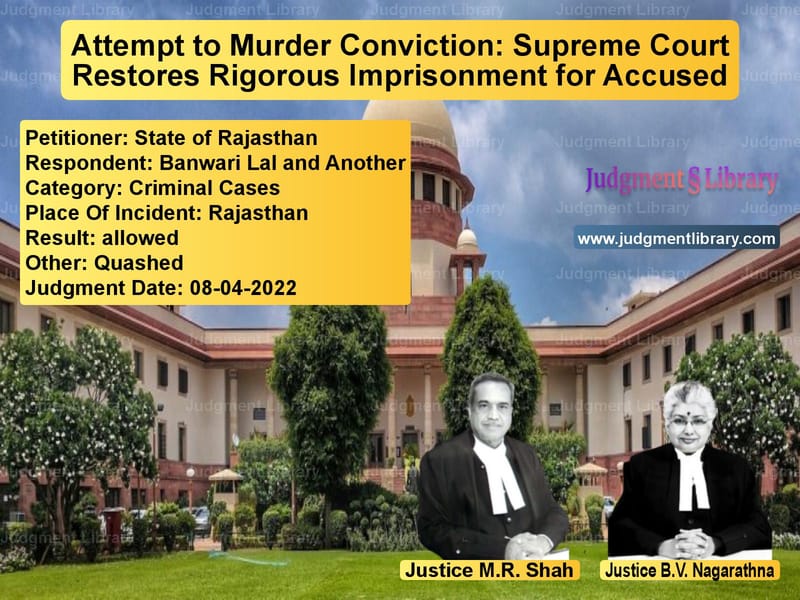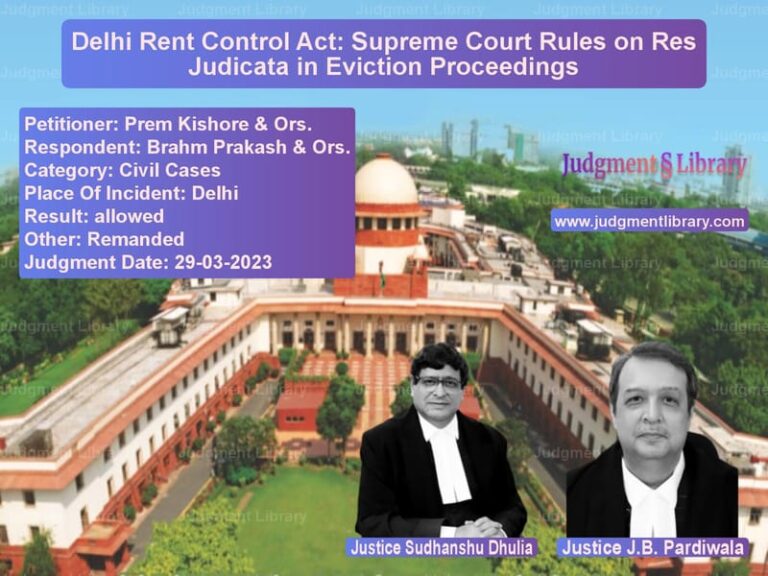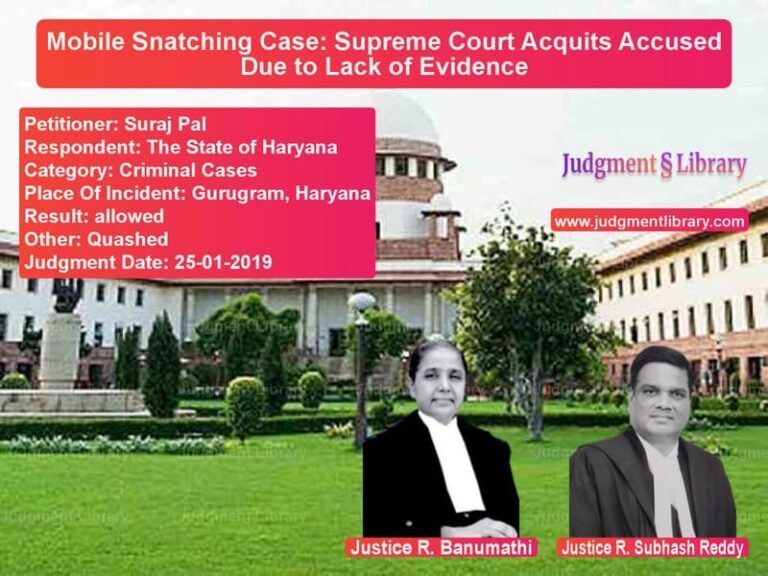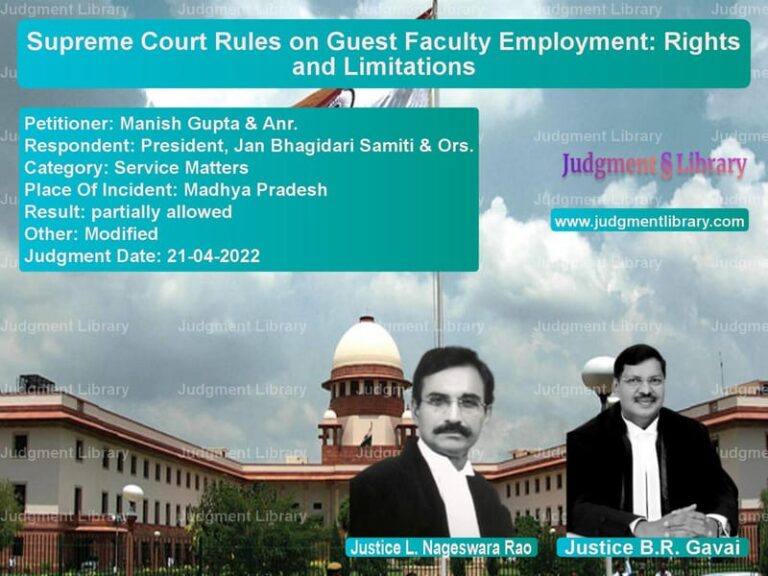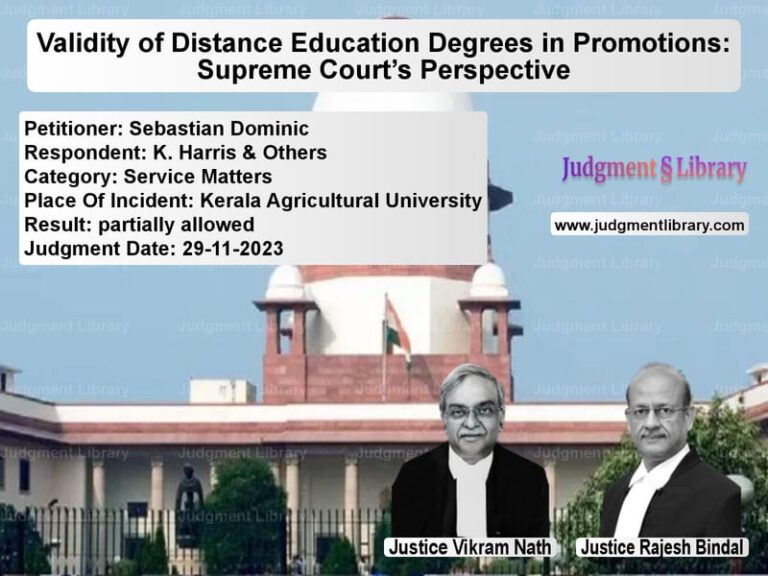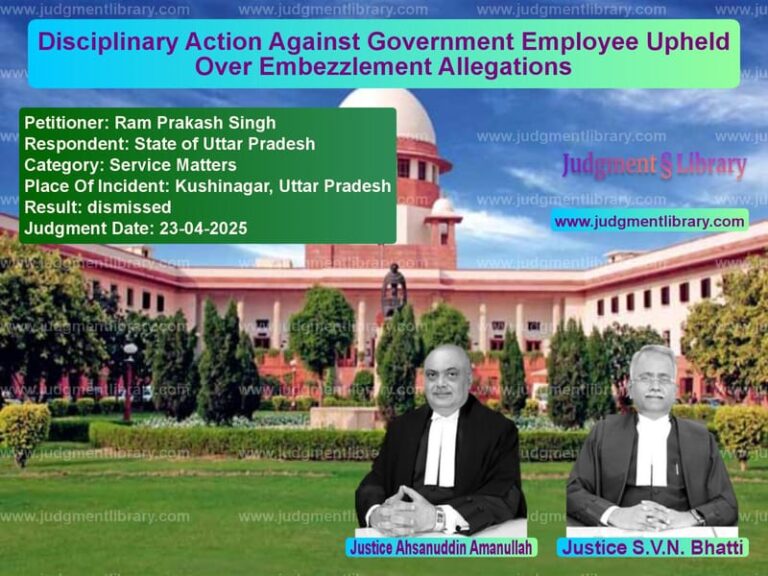Attempt to Murder Conviction: Supreme Court Restores Rigorous Imprisonment for Accused
The Supreme Court of India recently ruled in State of Rajasthan vs. Banwari Lal & Another, reinstating a three-year rigorous imprisonment sentence for an accused convicted under Section 307 of the Indian Penal Code (IPC). The judgment overturned a Rajasthan High Court ruling that had reduced the sentence to the period already undergone (44 days), emphasizing the importance of proportionate punishment in serious crimes.
This decision clarifies the principles governing sentencing, ensuring that judicial leniency does not override the gravity of the offense. The ruling also set a precedent for courts to avoid casual and insufficient sentencing decisions in serious criminal cases.
Background of the Case
The case originated from a violent attack on Phool Chand, the victim, on March 31, 1989. The accused, Banwari Lal, along with others, was tried for multiple offenses, including Sections 147 (rioting), 148 (armed rioting), 149 (unlawful assembly), 447 (criminal trespass), and 323 (causing hurt), along with Section 307 IPC for attempted murder.
According to medical reports, Phool Chand suffered a deep lacerated wound of 10×1 cm, which extended to the brain membrane, exposing the bone. The trial court found Banwari Lal guilty under Section 307 IPC and sentenced him to three years of rigorous imprisonment. The second accused, Mohan Lal, was convicted under Section 324 IPC (causing hurt by dangerous weapons) but was released on probation.
Both accused appealed to the Rajasthan High Court. Banwari Lal did not challenge his conviction but requested a reduction in sentence, citing the lapse of 26 years since the incident and his clean conduct thereafter. The High Court, accepting these arguments, reduced his sentence to the period already undergone (44 days). The State of Rajasthan challenged this reduction before the Supreme Court.
Petitioner’s Arguments
The State of Rajasthan, represented by its counsel, contended that:
- The High Court had erred in reducing the sentence without analyzing the gravity of the offense and the serious nature of the injuries inflicted on the victim.
- The trial court had already taken a lenient view by imposing only three years of rigorous imprisonment, despite the fact that the injury was life-threatening and could have resulted in death.
- Reducing the sentence to 44 days amounted to a travesty of justice, as it failed to uphold deterrence and proportionality in sentencing.
- Judicial discretion in sentencing must align with legal principles and should not be exercised arbitrarily.
Respondents’ Arguments
The accused, represented by their counsel, argued that:
- The incident had occurred over 26 years ago, and both accused had since led law-abiding lives.
- Banwari Lal had already spent 44 days in jail, and further imprisonment would serve no constructive purpose.
- The High Court’s decision was justified, as it considered the accused’s advanced age and the long period since the crime.
- The delay of 1880 days in filing the appeal before the Supreme Court should prevent reconsideration of the sentence.
Supreme Court’s Judgment
The Supreme Court bench, comprising Justices M.R. Shah and B.V. Nagarathna, rejected the High Court’s leniency and reinstated the three-year rigorous imprisonment sentence. The key observations made by the Court were:
- Inadequacy of Sentence: The Court held that reducing the sentence to 44 days undermined the principles of justice and deterrence.
- Severity of the Crime: The Court emphasized that the injuries inflicted were serious, and the trial court’s sentencing was already lenient.
- Principles of Sentencing: The judgment reiterated that sentencing should consider the nature of the offense, the injuries caused, and the societal impact of the crime.
- Judicial Discretion: The Court stated that while judges have discretion in sentencing, such discretion must be exercised based on legal principles and proportionality.
- Condoning Delay: The Court condoned the delay in filing the appeal, emphasizing that justice should not be compromised due to procedural lapses.
Implications of the Judgment
The ruling has significant implications for criminal sentencing:
- Reaffirming Proportional Punishment: The judgment reinforces that punishment must match the severity of the offense.
- Judicial Accountability: It ensures that courts do not grant undue leniency without strong legal justification.
- Protecting Public Confidence: The decision helps maintain trust in the judicial system by ensuring fair sentencing for serious crimes.
- Standardization of Sentencing: The ruling discourages arbitrary reductions in sentences without proper reasoning.
Conclusion
The Supreme Court’s ruling in State of Rajasthan vs. Banwari Lal & Another is a landmark decision reinforcing the principles of proportionality and deterrence in sentencing. By overturning an excessively lenient High Court ruling, the judgment ensures that serious offenses receive appropriate punishment. This decision serves as a critical precedent in criminal law, emphasizing that judicial discretion in sentencing must align with legal principles and societal interests.
Petitioner Name: State of Rajasthan.Respondent Name: Banwari Lal and Another.Judgment By: Justice M.R. Shah, Justice B.V. Nagarathna.Place Of Incident: Rajasthan.Judgment Date: 08-04-2022.
Don’t miss out on the full details! Download the complete judgment in PDF format below and gain valuable insights instantly!
Download Judgment: state-of-rajasthan-vs-banwari-lal-and-anot-supreme-court-of-india-judgment-dated-08-04-2022.pdf
Directly Download Judgment: Directly download this Judgment
See all petitions in Attempt to Murder Cases
See all petitions in Bail and Anticipatory Bail
See all petitions in Custodial Deaths and Police Misconduct
See all petitions in Judgment by Mukeshkumar Rasikbhai Shah
See all petitions in Judgment by B.V. Nagarathna
See all petitions in allowed
See all petitions in Quashed
See all petitions in supreme court of India judgments April 2022
See all petitions in 2022 judgments
See all posts in Criminal Cases Category
See all allowed petitions in Criminal Cases Category
See all Dismissed petitions in Criminal Cases Category
See all partially allowed petitions in Criminal Cases Category

